What Are the Science-Backed Health Benefits of Kiwi
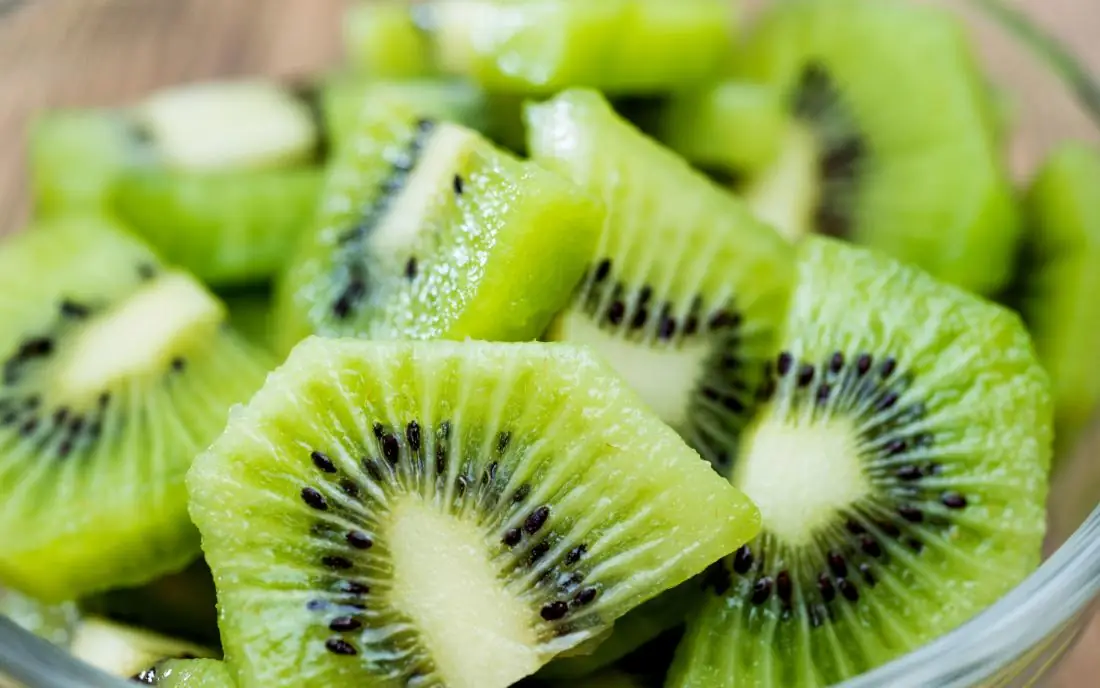
Pleasantly tangy and deliciously sweet, kiwis are in a league of their own when it comes to their antioxidant content. What are the health benefits of kiwi fruit? Is its skin edible? Are kiwi berries a good choice for your salads?
Read on and you will find the answers to all these and numerous other questions.
Kiwi Fruit: Nutrition Benefits
A small fruit that weighs about 100 grams (or 3.5 oz), kiwi is loaded with vitamins and contains measurable quantities of biologically active compounds.
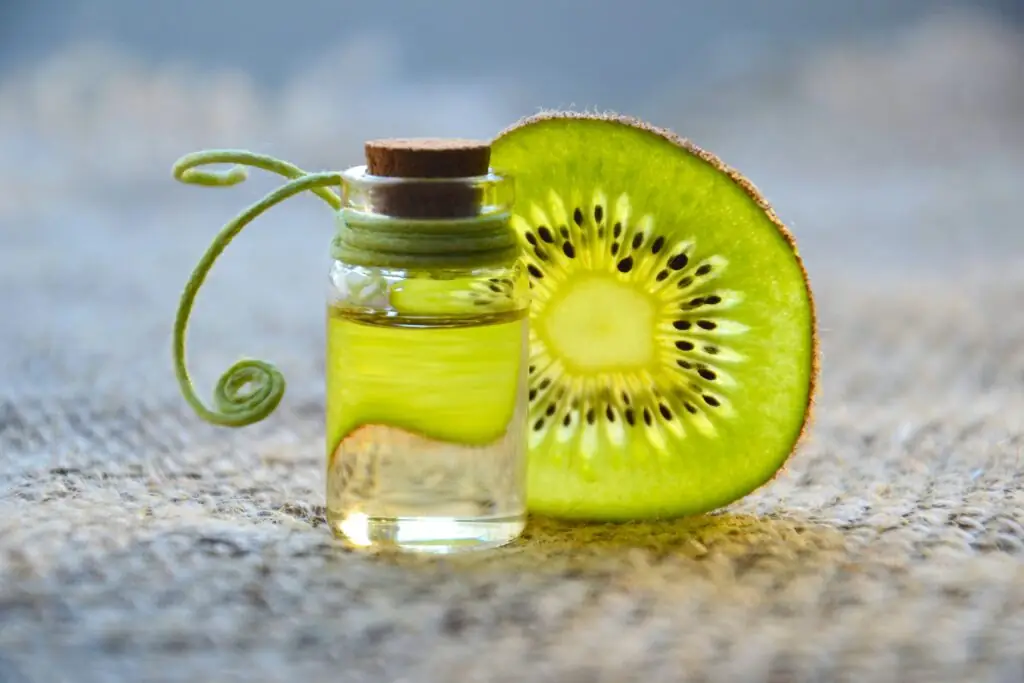
Vitamin Content
A single kiwifruit contains all the vitamin C (ascorbic acid) you need for a day. While everybody knows that ascorbic acid is essential for your immune system, this potent antioxidant is also extremely important for skin and cartilage health and indispensable for optimal iron absorption.
Kiwifruit is also a very good source of vitamin K, which has two important biological roles: it is essential for normal blood clotting and helps bones and other tissues absorb calcium.
What’s more, a single kiwifruit also offers measurable (10% of the recommended daily value, DV) quantities of vitamin E, another important antioxidant that protects your body’s cells from detrimental free radicals.
It needs to be said, however, that while kiwifruit contains almost all of the B vitamins, their actual amounts are rather low. Thus, to have a balanced diet, supplement kiwis with foods that are rich in B vitamins, such as eggs, meat, poultry, seeds, and legumes.
Mineral Content
Generally speaking, kiwis are not a very good source of dietary minerals. A single kiwifruit contains copper (7% DV), potassium (7%), magnesium (5% DV), manganese (5% DV), and phosphorus (5% DV): use other food sources to get these minerals in higher quantities.
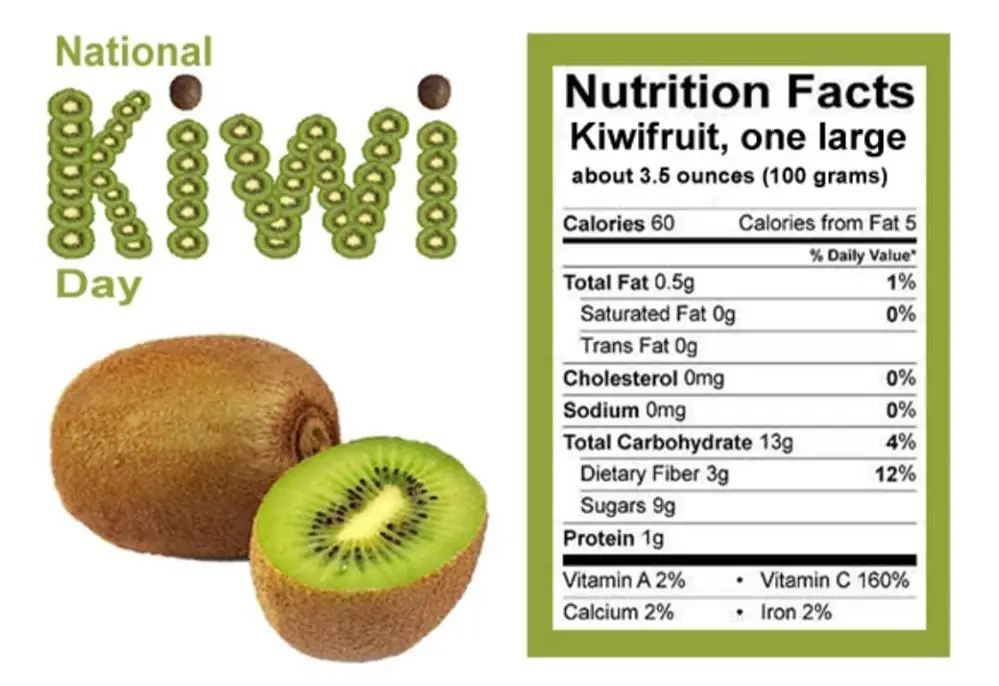
Dietary Fiber and Water
There are more than 80 grams of water and about 3 grams of dietary fiber in a single kiwifruit. As good bacteria that live in your gut feed on dietary fiber, foods that are rich in it help you take care of your intestinal health. What’s more, dietary fiber cannot be digested and helps you feel full while getting almost no calories: this can be important if you try to limit your caloric intake and want to lose weight.
Last but not least, dietary fiber and water make your stool bulkier and heavier which effectively helps prevent constipation. A 2020 study proves that kiwifruit is as effective in treating constipation as such natural treatments as psyllium and prunes. Additional benefits of kiwis include the lowest rate of adverse health effects and greater satisfaction of patients with such therapy.
Carotenoids
Kiwis are also rich in carotenoid compounds such as lutein and zeaxanthin. Carotenoids are believed to protect the retina, reduce risks of heart disease, and even alleviate symptoms of depression.
Digestion Promotion
What is the most unexpected health benefit of kiwi fruit? Kiwis contain a natural enzyme called actinidain that aids the digestive process. In fact, a slightly tangy taste of kiwis is caused by actinidain reacting with your tongue and the inner surface of the cheeks. Commercially, actinidain is used as a meat tenderizer, and if you periodically suffer from indigestion or have eaten a meal with a lot of meat, kiwifruit might be of great help.
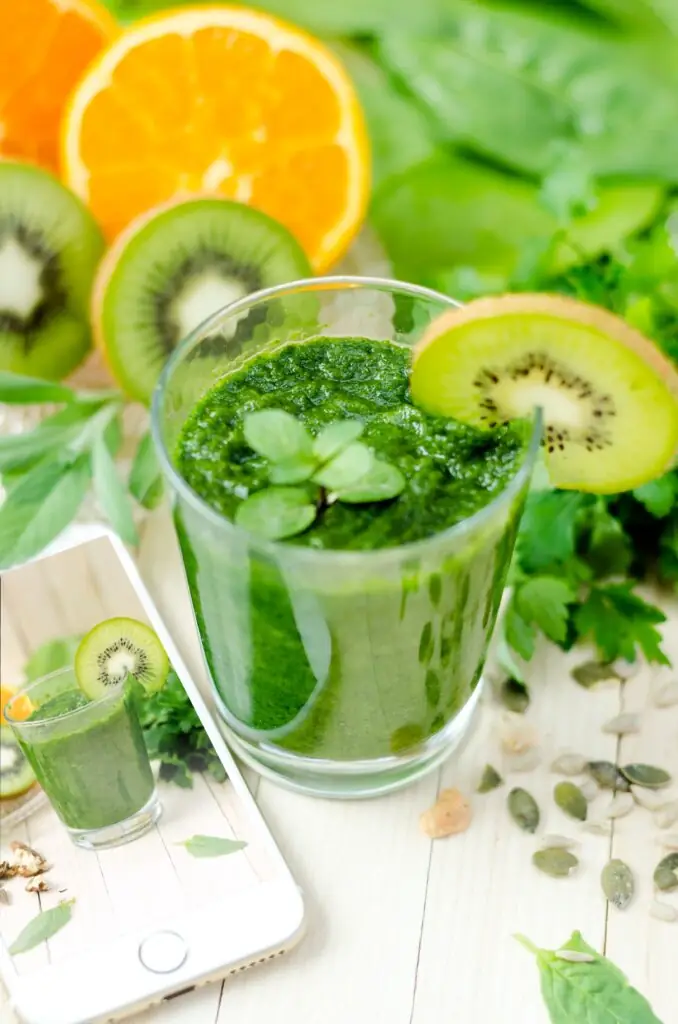
Is Kiwi 100% Healthy?
While the natural enzyme actinidain helps your digestion and therefore is good for your health, it is also known to sometimes cause allergic reactions. What’s more, scientists identified 12 other allergens that are present in kiwifruit. A 2015 review states that children are more prone to have an allergy to kiwi than adults. Typical symptoms of allergic reactions include:
- trouble swallowing
- swollen tongue & itchy throat
- difficulty breathing
- hives
- pain in the stomach and vomiting
For these reasons children should not be given large quantities of kiwifruit if you are not absolutely sure that they are non-allergic to it. Kids often cannot properly communicate that there is something wrong with their health, so if you give them kiwifruit, be sure to actively monitor their condition.
On the bright side, people who do not suffer from allergies to kiwis do not need to limit their consumption of this fruit.
What Health Benefits Does Kiwi Have: an FAQ
In this section you will find the answers to the most common questions about kiwifruit.
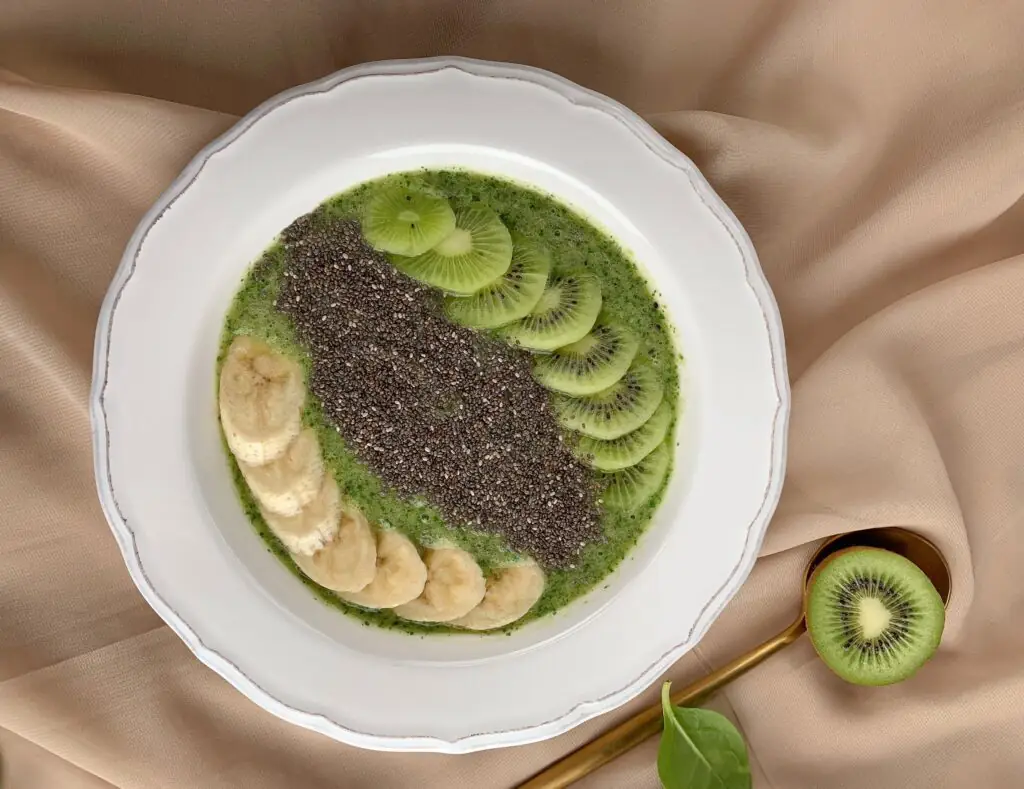
What Are the Health Benefits of Golden Kiwi Fruit?
Both varieties contain almost the same quantities of water, energy, vitamin E, B vitamins, and dietary minerals. The golden variety leads when it comes to the ascorbic acid content: it offers a dose of vitamin C that is almost twice as high compared to the regular green kiwifruit. Golden kiwis are also slightly richer in sugar, hence their sweeter taste. On the other hand, regular green kiwis are twice as rich in dietary fiber, which is important for intestinal health, and contain more than 6 times as much vitamin K.
All in all, if kiwis are your main source of vitamin C, then the golden variety is a better choice. If your diet includes other ascorbic acid-rich foods like bell peppers, blackcurrant, kale, brussels sprouts, strawberries, oranges, and lemons, then you might decide on the regular green variety, which is slightly better for maintaining your gut health.
Should You Eat Kiwi Skin?
Technically speaking, the skin of the fruit is perfectly edible. What’s more, as it is very rich in folate (vitamin B9), dietary fiber, and vitamin E, the actual health benefits of kiwi fruit skin are greater than most people expect. Thus, if you want to take care of your nervous system, prevent constipation, and get a dose of a potent antioxidant, eating kiwis unpeeled will be a very good choice. All you need to do is simply wash the fruit and rub it using a clean towel to get rid of most of the fuzz that covers the skin.
What’s more, if you find the skin too unpleasant to chew, you might want to give the above-mentioned golden variety a try. Many people agree that the skin of golden kiwis is much softer and has a more palatable taste compared to that of the green variety.
Which Is Healthier: An Apple or a Kiwi?
Although kiwis are not the best possible dietary source of B vitamins, vitamin E, and dietary minerals, they are still considerably richer in them compared to apples. What’s more, kiwifruit is an excellent source of vitamins C and K, while apple only features meager quantities of them. Kiwi is also a slightly better source of dietary fiber and vegetable protein.
For all these reasons, it looks like the famous saying needs to be corrected: it is a kiwi a day that keeps a doctor away, after all.
What Happens to Your Body When You Eat Kiwis Every Day?
As you get high quantities of antioxidant compounds, your skin gets younger, and you feel more energetic. Dietary fiber and water help you forget about constipation, while actinidain and similar enzymes that kiwis are rich in promote digestion. Vitamin C helps iron metabolism, and vitamin K promotes calcium absorption. In general, considering what can kiwi do for your body, this fruit fully deserves its superfood label.
How Many Kiwi Can I Eat a Day?
If you don’t have an allergy to kiwifruit, then you can eat as many kiwis as you like during the day.
If, on the other hand, you have never tasted this fruit before or only eaten small quantities of it, to avoid potential allergic reactions, it is recommended that you do not overindulge in kiwifruit. Increase your daily consumption of kiwis in small increments until you are fully sure that you are non-allergic to them.
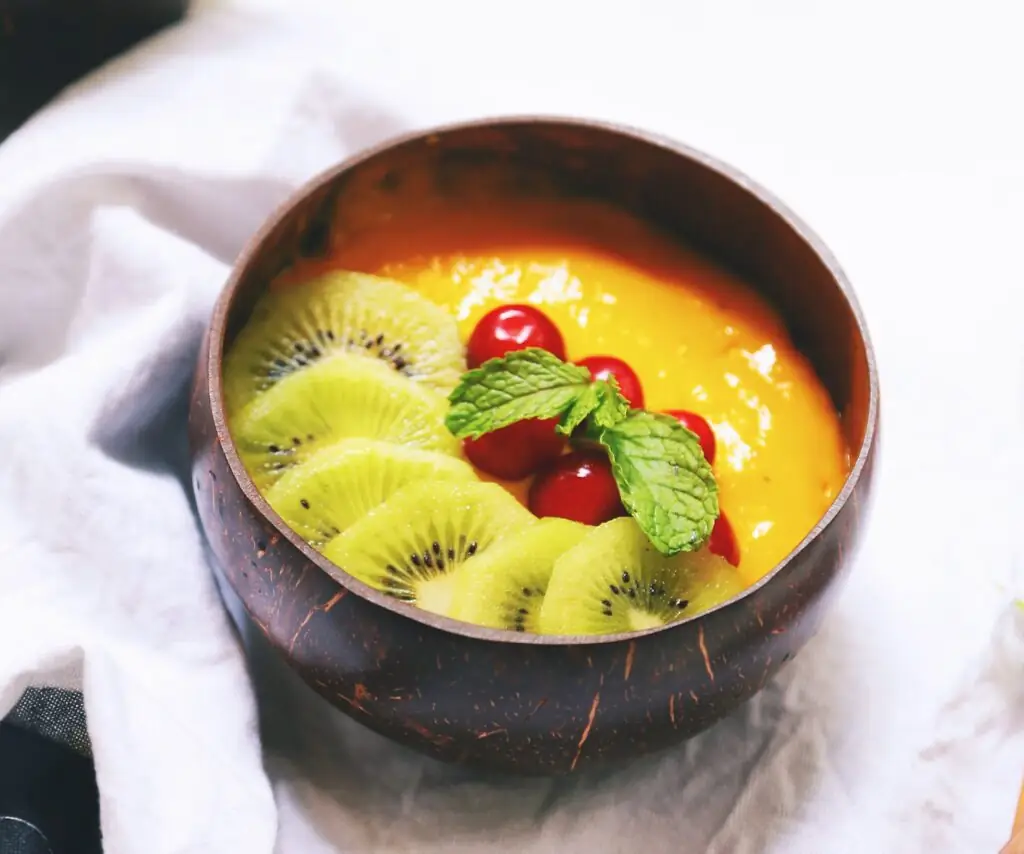
What Other Health Benefits Do Kiwi Have?
In a 2015 study people who consumed 3 kiwis per day achieved a marked reduction in blood pressure. Another 2015 study suggests that kiwifruit can be used to reduce total cholesterol. A 2012 study demonstrated that kiwis could be used to prevent increased platelet aggregation and atherosclerosis. While additional research is required, all these preliminary results are highly promising.
What Are the Nutritional and Health Benefits of Kiwi Berries?
Kiwi berries (or grape/baby kiwis) are not underdeveloped kiwis as some people think, but a separate species that is still very close botanically to kiwifruit. While these berries taste similar to their larger relatives, they don’t have the fuzzy skin that puts some people off.
Kiwi berries are an excellent source of vitamin C and contain copious amounts of lutein, a compound that is present in the section of the retina that is responsible for color vision. It is believed that the consumption of lutein can lower the risk of macular degeneration and cataract development. What’s more, these berries are rich in dietary fiber, vitamin E, and various bioactive phenolic compounds. You can use them for your fruit salads or add them to your smoothies. Now you know what are the health benefits of kiwi and why it is often called a superfood. It is worth bearing in mind, though, that no fruit or vegetable is a magic bullet by itself: it is highly important that you eat a balanced diet and do not neglect to exercise regularly.